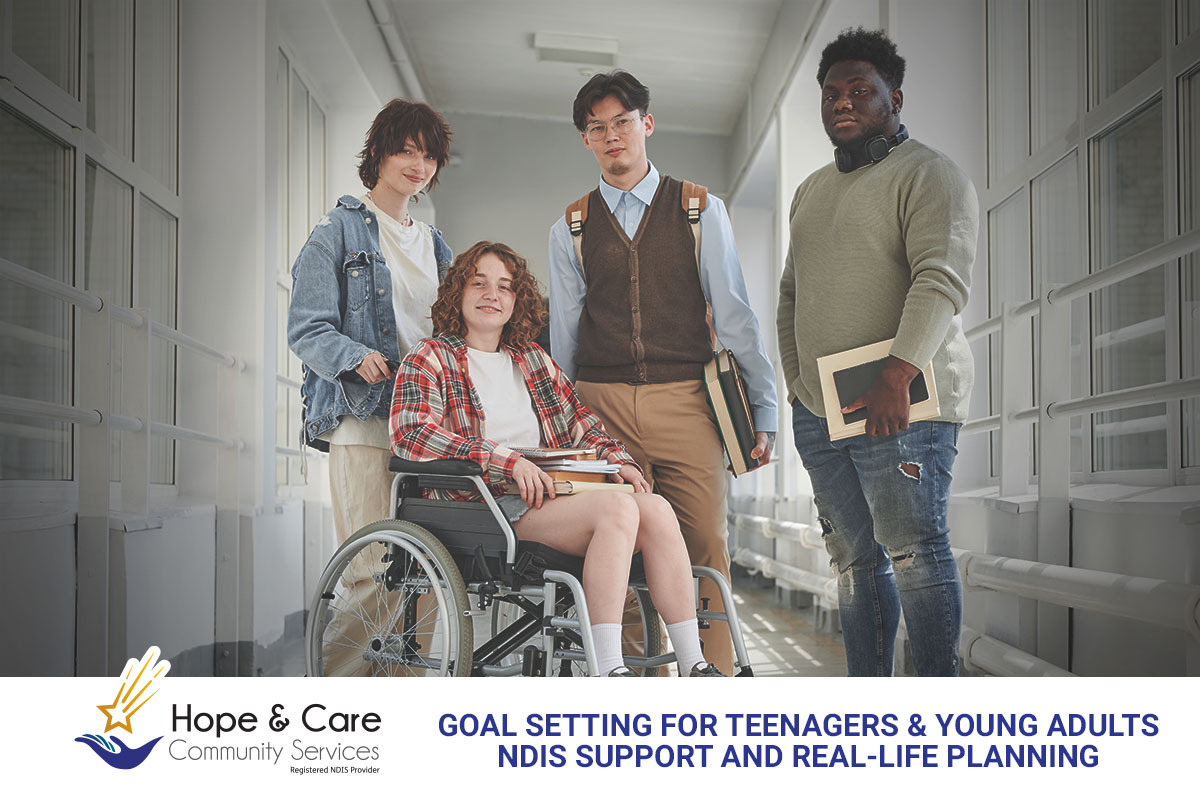
Goal Setting for Teenagers and Young Adults is essential during the teenage and young adult years, which are full of opportunities, challenges and change. For young people living with a disability, these years can come with unique needs but also exciting possibilities. Whether transitioning from high school, preparing for adult responsibilities, or exploring career options, one thing is clear: goal setting plays a vital role in shaping a positive and independent future.
At Hope & Care Community Services, we support teenagers and young adults to take control of their lives through effective goal setting and tailored NDIS supports. In this article, we will explore how setting the right goals supported by the NDIS can help young people lead more independent, fulfilling lives.
Why Goal Setting Is Important for Young People with Disability
Setting goals gives young people direction and control. For teenagers and young adults, it is an opportunity to think about the future, build skills and take the first steps towards independence.
Goal setting helps NDIS participants:
- Define what they want to achieve
- Break large ambitions into manageable steps
- Identify necessary supports and services
- Build decision-making and self-advocacy skills
- Stay focused, motivated and confident
When young people set goals that matter to them, they feel more empowered and supported. Whether the goal is to find a part-time job, complete a TAFE course or make new friends, the process encourages self-growth and achievement.
The NDIS Supports Changing Goals and Life Transitions
As young people move through school, transition into adulthood or prepare for employment, their needs naturally evolve. Fortunately, NDIS plans are flexible and designed to grow with participants.
If a teenager begins planning for post-school life, their NDIS plan can include supports such as:
- School leaver employment supports (SLES)
- Skill-building for independent living
- Transport or travel training
- Help accessing further education or training
- Social and community participation support
At Hope & Care, we work closely with participants to ensure their NDIS plans reflect their personal goals, life stage and future ambitions.
NDIS Goal Areas for Teenagers and Young Adults
NDIS participants aged 15 to 25 often focus on building independence, confidence and real-world skills. Below are some of the most common goal categories for young people on the NDIS:
Independent Living Skills
Many young people want to live more independently. This might involve goals such as:
- Learning to cook meals or grocery shop
- Managing personal hygiene and daily routines
- Handling money and creating a personal budget
- Catching public transport safely
NDIS Core Supports or Capacity Building funding can assist with these life skills through in-home supports or community access programs.
Employment and Career Readiness
As young adults enter the workforce, they may set goals such as:
- Gaining work experience or part-time employment
- Enrolling in vocational training or apprenticeships
- Developing job application and interview skills
- Building soft skills like teamwork and communication
The NDIS funds programs like SLES and can provide employment mentoring or job-coaching services.
Education and Learning
Some teenagers and young adults want to explore formal education pathways. Relevant NDIS goals may include:
- Researching and applying to university, TAFE or short courses
- Using assistive technology to support learning
- Receiving academic support or study skills coaching
Social Skills and Community Participation
Social goals are just as important as academic or work-related ones. NDIS participants may wish to:
- Join local clubs, interest groups or hobby-based activities
- Build friendships and social confidence
- Attend events or participate in recreational programs
The NDIS funds support that promotes social inclusion and community engagement key aspects of personal development.
Goal Setting Tips for Teenagers and Young Adults on the NDIS
Effective goal setting does not have to be complicated. Here are some strategies to help young people create goals that are clear, achievable and motivating:
- Start with what matters to you – Focus on your passions, dreams and interests
- Be specific – Instead of “be more independent,” say “learn to plan and cook three meals a week”
- Set short-term and long-term goals – Work towards milestones that support your future
- Break goals into small steps – This makes progress easier to see and less overwhelming
- Review and adjust regularly – Life changes and your goals can too
- Recognise your strengths – Use your skills to overcome challenges
- Celebrate success – Every small achievement brings you closer to your larger goal
When young people feel supported to set and reach their goals, they grow more confident in managing their own lives.
Building Confidence and Independence Through Goal Setting
Turning 18 is a major milestone. Legally, this marks the point where a young person becomes responsible for their own decisions. Developing decision-making and planning skills before this age is essential.
Goal setting gives teenagers the opportunity to:
- Take part in their own NDIS planning
- Practice making choices
- Learn how to communicate their needs and preferences
- Understand their rights as they move toward adulthood
Support workers, family and educators can encourage independence by involving young people in everyday decisions and NDIS reviews. In addition, the NDIS offers Capacity Building Supports such as:
- Self-advocacy and communication training
- Peer mentoring or coaching
- Community engagement activities
These services help teenagers and young adults prepare for a more independent and fulfilling adult life.
Final Thoughts: Turning Ambitions into Action
For teenagers and young adults living with disability, goal setting is more than just planning for the future it is about creating a life filled with purpose, self-belief and possibility.
By setting achievable goals and accessing the right NDIS supports, young people can build skills, overcome challenges and take meaningful steps toward their dreams.
About Hope & Care Community Services
Hope & Care Community Services (HCCS) is a trusted NDIS registered provider in Queensland, committed to supporting young people with disability on their journey toward independence and personal growth. Our dedicated team works with each individual to develop tailored NDIS plans and build skills that align with their unique goals. Whether you’re planning your first job, preparing for life after school or looking to be more involved in your community, Hope & Care is here to support your success.
Want to learn more? Read other articles :
- Redefine Independence your own way – with HCCS
- Who’s Who: The Key Terms of Your NDIS Plan
- Foundational Supports: Building Blocks of NDIS Success
HCCS is a registered NDIS provider. Learn more about our services.
♥ We are available in Brisbane! – Our team is just a call away!
